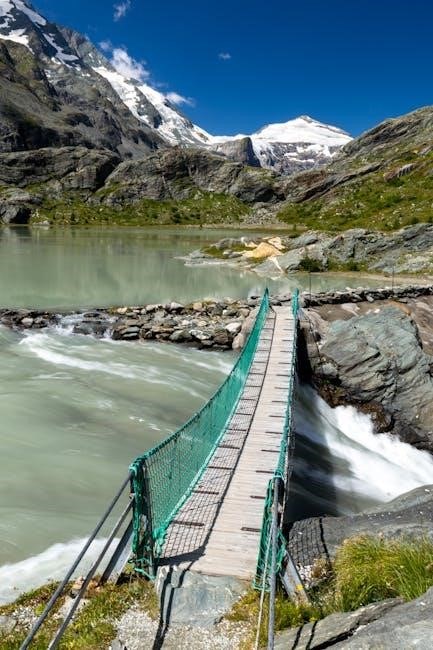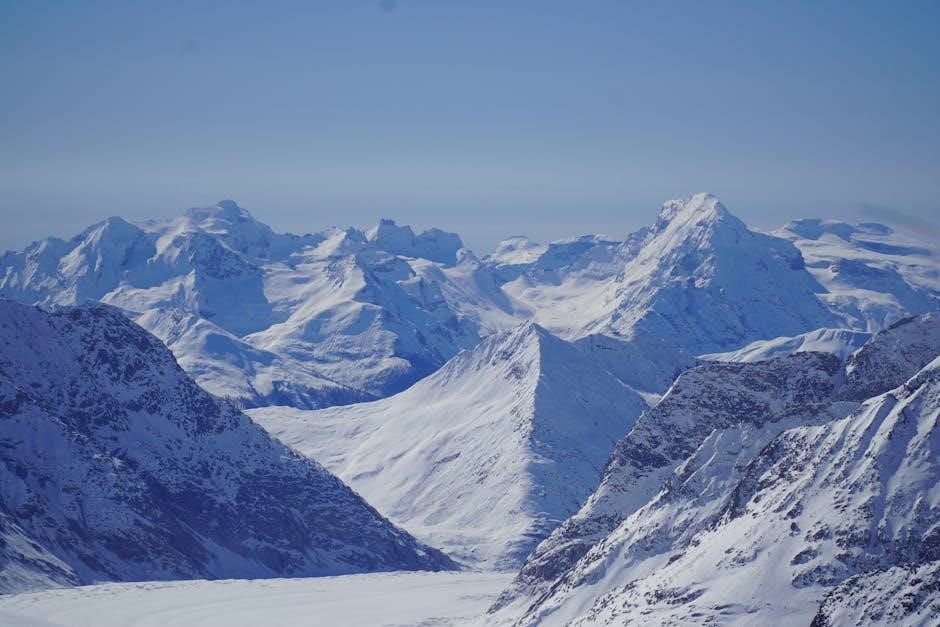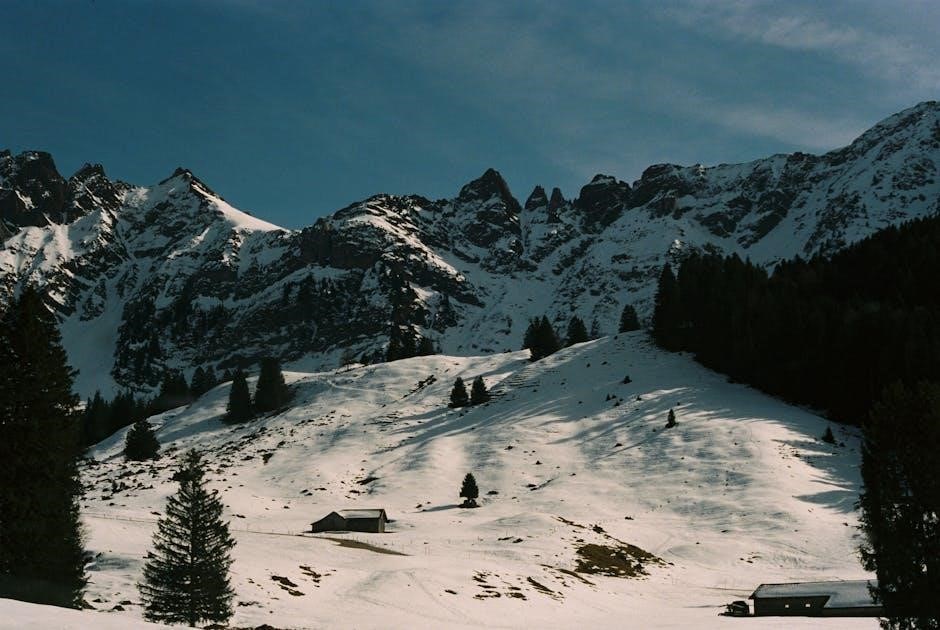The Alps stand as a premier destination, offering a unique blend of natural beauty, cultural richness, and adventure. Renowned for their majestic mountains and diverse landscapes, they attract travelers worldwide with their serene valleys, picturesque villages, and thrilling outdoor activities. Whether seeking relaxation or adrenaline-packed experiences, the Alps cater to all interests, making them a timeless and unforgettable destination.
1.1. Overview of the Alps’ Geographic Significance
The Alps are one of Europe’s most extensive mountain ranges, spanning across eight countries, including Switzerland, France, Italy, and Austria. Covering over 190,000 square miles, they form a central European backbone, influencing regional climates and cultures. Their diverse terrain includes snow-capped peaks, lush valleys, and alpine lakes, making them a vital geographic and ecological hub in Europe.
1.2. Why the Alps Are a Favorite Among Travelers and Adventure Seekers
The Alps captivate travelers with their breathtaking landscapes, from snow-capped peaks to serene valleys and crystal-clear lakes. Adventure seekers flock here for world-class skiing, hiking, and thrilling activities like canyoning and paragliding. The region’s rich cultural heritage, charming villages, and iconic landmarks like Linderhof Palace also attract history enthusiasts, making the Alps a versatile and irresistible destination for every kind of traveler.
Historical and Cultural Significance of the Alps
The Alps have shaped European history, serving as a crossroads for trade, warfare, and cultural exchange. Their rich heritage includes ancient traditions, medieval castles, and vibrant local customs, making the region a living museum of history and culture.
2.1. The Role of the Alps in European History
The Alps have played a pivotal role in shaping European history, serving as both a natural barrier and a vital trade route. They were a key theater in military campaigns, from Roman conquests to World War conflicts. Additionally, the region fostered cultural and religious movements, influencing art, architecture, and governance across the continent for centuries.
2.2. Traditional Alpine Cultures and Their Modern-Day Relevance
Alpine cultures, rich in folklore and traditions, continue to captivate visitors. Festivals, local crafts, and culinary delights like cheese-making and woodcarving highlight the region’s heritage. These traditions, passed through generations, are now embraced by modern travelers, offering a glimpse into the past while supporting local economies. The blend of history and contemporary charm makes Alpine culture a timeless attraction for global explorers seeking authenticity.

Popular Attractions and Landmarks in the Alps
The Alps boast iconic landmarks like the Matterhorn and Eiger, drawing millions annually. Their breathtaking vistas and historical significance make them must-visit destinations for global travelers and photographers alike.
3.1. Iconic Alpine Landmarks Like the Matterhorn and Eiger
The Matterhorn and Eiger are iconic Alpine landmarks, renowned for their dramatic peaks and challenging climbs. The Matterhorn, with its pyramidal shape, stands as a symbol of Switzerland, while the Eiger’s north face is legendary among mountaineers. Both attract adventurers and photographers, offering breathtaking views and unforgettable experiences in the heart of the Alps.
3.2. Hidden Gems and Lesser-Known Alpine Destinations
Beyond the famous peaks, the Alps hide enchanting destinations. Linderhof Palace, nestled in Bavarian foothills, offers a fairytale-like experience with guided tours. Hidden Alpine villages and serene valleys provide breathtaking views and peaceful retreats. These lesser-known spots, rich in cultural heritage, showcase traditional architecture and local charm, making them perfect for those seeking tranquility and authenticity amidst nature’s splendor.
Hiking and Trekking in the Alps
The Alps offer diverse hiking trails for all skill levels, from easy strolls to challenging treks. With stunning vistas, pristine lakes, and lush meadows, each trail promises unforgettable experiences.
4.1. Best Hiking Trails for Beginners and Experienced Trekkers
The Alps boast trails for every hiker, from gentle paths like Switzerland’s Flower Trail to challenging routes such as the Tour du Mont Blanc. Beginners can enjoy scenic walks with minimal elevation, while experienced trekkers can tackle rigorous climbs and high-altitude routes, offering breathtaking views of glaciers and alpine peaks. Proper planning and gear are essential for all levels.
4.2. Essential Gear and Safety Tips for Alpine Hiking
Sturdy hiking boots, layered clothing, and a weather-resistant jacket are must-haves. Carry a map, compass, and GPS device for navigation. Pack a first-aid kit, water, and snacks. Always check weather forecasts and inform someone of your route. Stay aware of trail signs and avoid risky paths. Respect nature and wildlife to ensure a safe, enjoyable experience in the Alps.
Winter Sports and Activities in the Alps
The Alps offer world-class skiing, snowboarding, and ice climbing, attracting enthusiasts globally. With top-tier resorts and diverse winter activities, the region delivers unforgettable experiences for all skill levels.
5.1. World-Class Ski Resorts and Their Amenities
The Alps boast iconic ski resorts like Zermatt and St. Moritz, offering state-of-the-art facilities, diverse slopes for all skill levels, and luxurious amenities. These destinations provide unparalleled skiing experiences, complemented by high-end lodges, gourmet dining, and vibrant après-ski scenes. Many resorts also feature breathtaking views, access to glaciers, and proximity to cultural landmarks, making them a hub for winter enthusiasts seeking both adventure and relaxation.
5.2. Beyond Skiing: Snowboarding, Ice Climbing, and More
Beyond skiing, the Alps offer thrilling alternatives like snowboarding, ice climbing, and snowshoeing. Snowboarders find diverse terrains, from gentle slopes to challenging parks. Ice climbing enthusiasts can tackle frozen waterfalls, while snowshoeing provides a serene way to explore untouched winter landscapes. These activities, supported by expert guides and modern facilities, cater to all adventurers seeking unique winter experiences in the Alpine wonderland.

Alpine Adventures for Thrill-Seekers
The Alps offer unparalleled adventures for thrill-seekers, from canyoning in the Swiss Alps to paragliding over breathtaking landscapes. These activities provide unforgettable experiences for the bold and adventurous.
6.1. Canyoning in the Swiss Alps: A Thrilling Adventure
Canyoning in the Swiss Alps offers an exhilarating experience, combining rappelling, diving, and sliding through stunning Alpine gorges. This action-packed adventure allows thrill-seekers to explore the region’s rugged beauty up close, immersing themselves in the breathtaking natural landscapes while testing their limits in a safe yet adrenaline-fueled environment.
6.2. Paragliding and Other Extreme Sports in the Alps
Paragliding in the Alps offers a bird’s-eye view of stunning mountain vistas, blending serenity with excitement. The crisp Alpine air and thermals provide ideal conditions for soaring above peaks. Beyond paragliding, the region hosts extreme sports like ice climbing, rock climbing, and via ferrata, each offering unique challenges and unforgettable experiences for adventure enthusiasts seeking to push their limits.
Sustainable Tourism in the Alps
Sustainable tourism in the Alps emphasizes eco-friendly practices, such as reducing carbon footprints and preserving natural beauty. Travelers are encouraged to support local communities by choosing environmentally responsible accommodations and activities, ensuring the region remains pristine for future generations while promoting cultural and economic prosperity.
7.1. Eco-Friendly Practices for Travelers
Eco-friendly practices in the Alps include minimizing waste, using public transport, and choosing accommodations with green certifications. Travelers can reduce their carbon footprint by avoiding single-use plastics and respecting protected areas. Supporting local businesses and seasonal products also aids in preserving the region’s biodiversity and cultural heritage, ensuring a sustainable future for the Alps.
7.2. Supporting Local Communities Through Responsible Tourism
Supporting local communities in the Alps involves staying in family-run accommodations, dining at local restaurants, and purchasing regional products. Engaging with local guides ensures revenue stays within the community. By respecting traditions and minimizing environmental impact, travelers contribute to sustainable development, fostering a vibrant future for Alpine villages and their unique cultural heritage while enjoying authentic experiences.
Culinary Delights of the Alpine Region
The Alps offer a rich culinary experience, blending hearty mountain dishes with fresh, local ingredients. From fondue to raclette, these flavors reflect the region’s cultural diversity and tradition.
8.1. Traditional Alpine Cuisine and Local Specialties
The Alps boast a rich culinary tradition, featuring hearty dishes like fondue, raclette, and schnitzel, made with fresh dairy, cheese, and meats. Local specialties such as strudel, tartes, and cured meats reflect the region’s cultural heritage; These flavors, often enjoyed in cozy mountain huts, showcase the Alpine lifestyle’s simplicity and warmth, offering a delicious connection to the region’s history and customs.
8.2. Wine Tasting and Breweries in the Alps
The Alps are home to a thriving wine and beer culture, with local vineyards producing crisp whites and earthy reds. Craft breweries offer hearty Alpine beers, perfect for pairing with regional cuisine. Wine tasting tours and brewery visits provide a unique chance to explore the region’s flavors, offering a delightful complement to the stunning mountain scenery and cultural experiences.
Guided Tours and Expert Guides
Expert guides offer unparalleled insights into the Alps’ hidden gems and cultural heritage. Local knowledge enhances safety and enriches experiences, ensuring memorable and well-organized adventures for all explorers.
9.1. The Importance of Hiring Local Guides for Alpine Expeditions
Hiring local guides is crucial for Alpine expeditions, as their deep knowledge of trails, weather, and culture ensures safety and enhances experiences. Guides provide insider tips, historical context, and navigation expertise, making journeys smoother and more rewarding. Their familiarity with the terrain minimizes risks, allowing travelers to focus on enjoying the breathtaking landscapes and unique traditions of the region.
9.2. Recommended Guided Tours for Varied Interests
Guided tours in the Alps cater to diverse interests, offering curated experiences for every traveler. History enthusiasts can explore cultural heritage sites, while adventure seekers might opt for thrilling activities like canyoning or paragliding. Nature lovers can join hiking tours to discover hidden alpine gems, and foodies can embark on culinary journeys to sample local delicacies and wines, ensuring a memorable and tailored experience.

Safety and Preparation for Alpine Expeditions
Safety is paramount in the Alps. Proper preparation, including gear and weather awareness, ensures a secure and enjoyable experience amidst the rugged, breathtaking mountain environment.
10.1. Weather Conditions and How to Prepare
The Alps’ weather can be unpredictable, with rapid changes in conditions. Hikers should prepare for varying temperatures, potential snow, and strong winds. Always check forecasts before heading out and carry appropriate gear, including layered clothing, waterproof jackets, and sturdy footwear. Bring a map, compass, and GPS for navigation, as visibility can decrease quickly in cloudy or stormy weather. Stay informed and pack essentials like extra water, snacks, and a first-aid kit to ensure safety during your Alpine expedition.
10.2. Emergency Protocols and Rescue Services in the Alps
Emergency protocols in the Alps include dialing 112 for immediate assistance. Carry a whistle, first-aid kit, and map. Stay visible on trails and inform someone of your itinerary. Rescue services are efficient, but delays can occur in remote areas. Ensure phone coverage and consider hiring a guide for high-risk routes. Always check weather forecasts to avoid unsafe conditions and plan for emergencies.

Seasonal Activities in the Alps
The Alps offer diverse seasonal activities, from summer hiking and biking to winter skiing and snowshoeing. Festivals and cultural events add to their year-round appeal.
11.1. Summer Adventures: Hiking, Biking, and More
The Alps transform into a summer paradise, offering extensive hiking and biking trails for all skill levels. From leisurely strolls through picturesque villages to challenging mountain treks, the options are endless. For thrill-seekers, activities like canyoning provide unforgettable experiences. With detailed guides like Cicerone’s series, visitors can explore hidden gems and enjoy breathtaking alpine vistas.
11.2. Winter Wonderland: Skiing, Snowshoeing, and Festivals
The Alps become a magical winter wonderland, offering world-class skiing, serene snowshoeing trails, and vibrant festivals. Ski resorts boast well-groomed slopes for all skill levels, while snowshoeing provides a peaceful way to explore untouched landscapes. Festivals illuminate the season with twinkling lights, local delicacies, and cultural traditions, creating an enchanting atmosphere for visitors seeking a unique winter experience.
Embark on your Alpine adventure with careful planning and respect for nature. Cherish the breathtaking landscapes, immerse in local cultures, and create unforgettable memories in this iconic region.
12.1. Final Thoughts on Planning the Perfect Alpine Trip
Planning an Alpine trip requires thorough research and preparation. Consider seasonal activities, weather conditions, and local guides for a seamless experience. Mix famous spots with hidden gems like canyoning in the Swiss Alps for a thrilling adventure. Book accommodations in advance, especially during peak seasons. Embrace the region’s scenic beauty, cultural richness, and outdoor thrills for an unforgettable journey.
12.2. Encouragement to Explore and Respect the Alpine Environment
Embrace the Alpine environment with curiosity and care. Explore its breathtaking landscapes responsibly, ensuring minimal impact on nature. Respect local ecosystems, wildlife, and cultural heritage. Adhere to eco-friendly practices to preserve the Alps’ beauty for future generations. By doing so, you contribute to sustainable tourism and leave a positive legacy in this incredible region.
